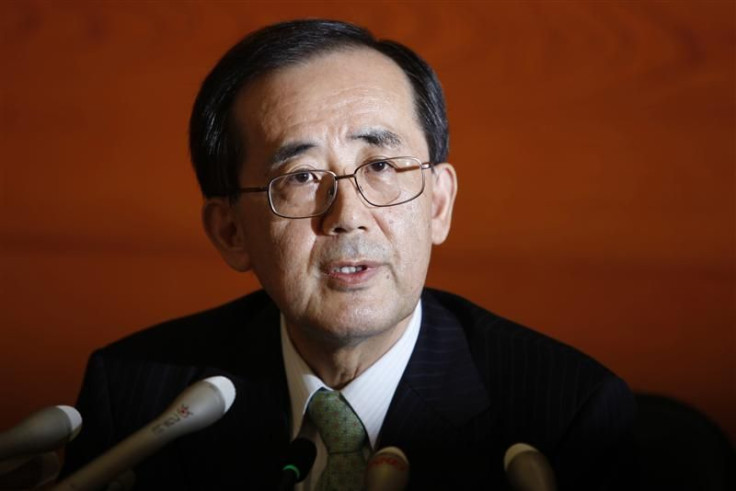BOJ Signals More Aggressive Policy, Sets Inflation Goal

(REUTERS) - The Bank of Japan boosted its asset buying program by $130 billion on Tuesday and in the face of political pressure set an inflation goal of one percent, signaling a more aggressive monetary policy to pull an ailing economy out of deflation.
Bond futures jumped and the yen fell as the decision pointed to much faster asset buying in the central bank's most determined effort to date to reinflate an economy that shrank last year and which has struggled with deflation for most of the last two decades.
The central bank kept its policy rate in a range of zero to 0.1 percent and pledged not just to maintain zero rates but to continue buying assets until one percent inflation is foreseen.
But coming after government calls for action, some analysts worried the policy easing undermined the central bank's independence and left it open to further pressure from lawmakers, especially if more aggressive U.S. monetary stimulus exerts fresh upward pressure on the yen.
The BOJ apparently bent to political pressure, leaving the market with the impression of its vulnerability, said Yuichi Kodama, an economist at Meiji Yasuda Life Insurance.
If the Fed embarks on additional easing, the BOJ is likely to come under pressure again and again and it may tweak its asset purchase scheme and start buying government bonds with longer maturities.
In a move that surprised markets, the central bank added 10 trillion yen ($130 billion) to its 20 trillion yen pool of funds set aside to buy assets. The new money is earmarked entirely for long-term government bonds.
The BOJ said it will set consumer inflation of one percent as its price goal for the time being, a clearer commitment to end deflation. It had previously defined one percent inflation as its understanding of long-term price stability.
We will be buying massive amounts of government bonds, Governor Masaaki Shirakawa told reporters. This is designed to achieve sustained economic growth under stable prices.
Ten-year government bond futures jumped and the yen dipped as much as 0.4 percent on the BOJ news.
TIMING PUZZLES MARKETS
Most central banks set inflation targets to anchor expectations and prevent prices from rising too quickly. In Japan's case, an inflation goal will act as an incentive to pursue more aggressive easing to stop prices from declining.
Core inflation fell in 2011 for the third straight year.
The Fed last month took a historic step of setting an inflation target and extended its commitment to near zero rates, leaving the door open to more easing that could further weaken the dollar and put the yen under renewed upward pressure.
The yen rose to record highs against the dollar last year, sparking a wave of corporate calls for official action and prompting unilateral currency intervention by Japan on Oct 31.
The BOJ's steps follow weeks of growing calls from politicians to follow the Fed's example and set an explicit inflation target to show a greater commitment to boosting the economy, which shrank 0.9 percent last year largely as yen strength hurt export earnings.
The timing came as a surprise as many central bankers had suggested there was little reason to act now because the yen had backed off its record highs and the economy was on course for a moderate recovery.
The BOJ eased policy while maintaining expectations for a moderate recovery, unlike in the past when it responded to a worsening economic outlook. Shirakawa said Tuesday's decision was aimed at giving the recovery additional support, shrugging off suggestions the BOJ had yielded to government pressure or was monetizing debt.
There are some bright economic signs at home and abroad. We'd like to ensure they are sustained, he said.
MORE TO COME
While the BOJ changed its language in describing one percent consumer inflation as a near-term price goal, it avoided describing it as an explicit target.
Finance Minister Jun Azumi, however, told reporters he considered one percent as an effective inflation target, a sign the government will keep up pressure on the central bank to take further action.
Even under the new 30-trillion-yen target, the BOJ needs to buy 20 trillion yen more assets by year-end under time limits set in the scheme. It would mean buying government bonds at triple the pace from now.
In addition to the asset buying scheme, the BOJ has an existing 35 trillion yen pool of funds for lending to banks against collateral at the policy rate.
The BOJ may act again in coming months and is quietly reviewing an alternative to its asset buying scheme, which can probably only be topped up once or twice given it is already struggling to feed cash to markets awash with extra liquidity.
The central bank has decided to buy quite a large amount of JGBs and its mention of a stability goal with a specific target was not expected until the spring. It has acted more strongly than expected, said Katsutoshi Inadome, fixed income strategist at Mitsubishi UFJ Morgan Stanley Securities.
The bank still has further easing options left, like increasing the amount of assets it buys and buying JGBs with longer maturities.
($1=77.64 yen)
(Additional reporting by Rie Ishiguro, Kaori Kaneko and Tetsushi Kajimoto; Editing by Tomasz Janowski)
© Copyright Thomson Reuters {{Year}}. All rights reserved.





















